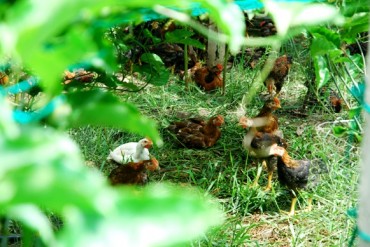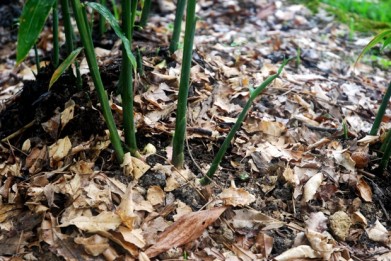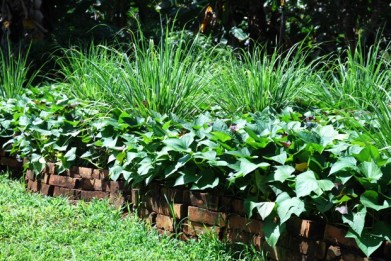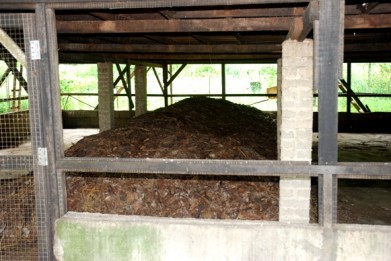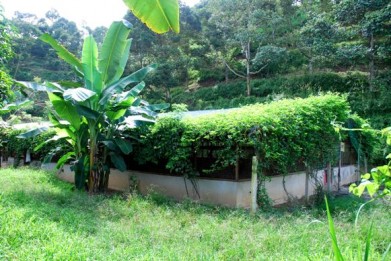Oct 08, 2011
Raising Free Range Chickens - Necropsy & Disease Identification
Being able to perform necropsy of dead chickens and to identify diseases is crucial for the success of a chicken farm.
Delays in disease identification can lead to outbreaks resulting in high mortality and economic losses.
It is absolutely necessary for detail records to be kept from Day 0 until all the chickens are sold, for each batch. Detail records will enable us to analyse out trends and history, which together with the lesions in organs will help identify the many causes of poor weight gain, mortality, etc.
For example, trend analysis enabled us to identify a non-gumboro spiking mortality phenomenon in young chicks below two weeks old, which we ultimately traced to mosquitoes.
Dirgha Bahadur Tamang, from Nepal, has reached competency in necropsy and disease identification.
Dirgha receiving his certificates from Razaly, the farm director
We provide him with a 3 inch thick file of laminated pictures of the key clinical signs of various common chicken diseases. He uses the pictures as a reference and when he sees the start of infectious disease in culled chickens, he will raise the alarm for quick pre-emptive action.
Dirgha with his certificates and his file on common poultry diseases
We hope to be able to sponsor him for further studies to be a vet some time in the future.

Dirgha performing a necropsy on a young chick.
Aug 03, 2011
Free Range Chicken - Natural Sun-Shading I
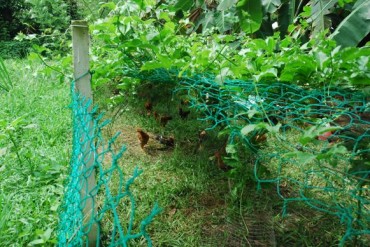
This Ramadan sure is hot. For the watermelon seller, bad sales surely is not his lot. The chickens listlessly loll. Under the markisa shelters. Aren't we glad we had tolled. These lovely markisa all to enjoy.
Yesterday was 40 celcius. Hot enough for these chickens to drop dead from heat stroke. And we are talking about ayam kampung, tough as nails!
Natural sun shading used in the farm includes these passion-fruit vines and clumps of big-leafed pisang sematu. Remember, bare earth retains and reflects heat. Bare earth patches can be 5 celcius higher than grass covered patches. And all water-lines MUST be protected from the sun.
A friend of mine is running a closed-house farm. He is cursing day-and-night over his energy bills.
Selamat berpuasa.
10:20 Posted in Chickens, Permaculture | Permalink | Comments (1) | Tags: permaculture, free range chickens, sun shading, passion fruit, markisa, ramadan
Apr 13, 2011
Permaculture At The Farm II
Here are more examples of permaculture (permanent agriculture) at the farm:
Mulching to reduce water loss. Previously we advocated sheet mulching (to reduce weeds, etc ) with cardboard and other cellulose based material. DON'T DO IT! Termites love these heavy cellulose material. Mulching in humid Malaysia should be light to avoid termites and fungal problems. Leguminous cover crop as living mulch is a better idea.
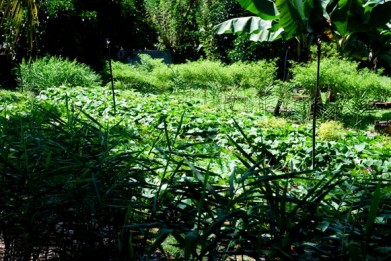
Multi-crop and companion planting of gingers, chilies, sweet potatoes, water melon and passion fruits on raised beds. Permaculture is antithetical to mono-cropping (think oil palm, or think dragon fruit farms; organic or otherwise). On a small farm level, mono-cropping often leads to increasing dependence on chemicals and crops are often decimated suddenly by disease. The recent demise of many dragon fruit farms, both conventional and organic, is one example.
Serai or lemon grass on raised beds with sweet potato as living mulch and companion. Once the sweet potatoes are harvested, leguminous cover crop will be planted to revitalise the soil.
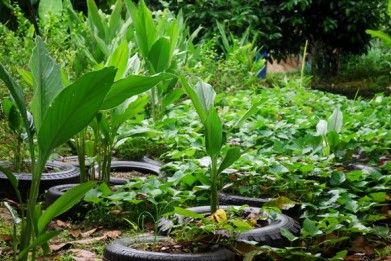
A low maintenance food garden grown entirely on used tires on low yield soggy, clayey soil. Practically no weeding is needed and monthly dressing of compost is all that's needed to produce sweet potatoes, curcuma mangga, lempoyang, kunyit and common ginger.
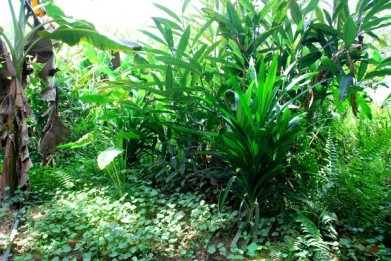
A 3000 sq ft food forest with very low maintenance, fed by a grey water treatment pond, producing taro, banana, papaya, pegaga, lengkuas, pandan, misai kucing, geranggau and other herbs. It provides a rich habitat for wild birds, eels, haruan, sepat, frogs, butterflies, insects, snakes, etc. It is one of our favorite spots in the farm. However, not everybody likes the overly 'friendly' snakes ( we counted 7 species so far ).
Under the traditional Asian chicken coop (on stilts), in-situ composting ( with the aid of farm-brewed IMOs ). This reduces human energy ( in having to remove the dung after every cycle). Removal of the composted material is done once every 8 months or so, and goes straight to the durian trees.
More examples of sun shading using plants - passionfruit, banana ( sematu, as it can reach 20 feet or more, high) and gliricidia septum.
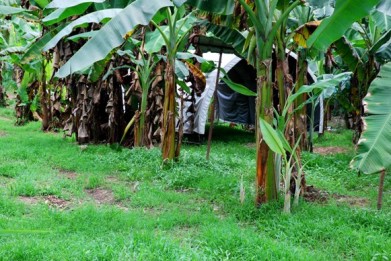
Integrating animal husbandry with fruits - here, free range chickens with bananas. There is no necessity to fertilise the fruit trees at all. Do not integrate durians with chickens.
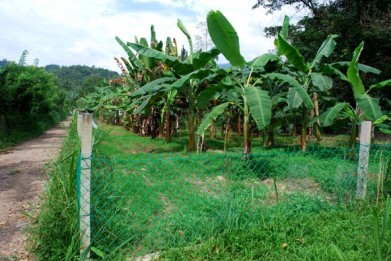
Sematu is best - it has large leaves providing good shade, grows fast and is more hardy than 'improved' bananas like mas or berangan. The sematu above are young trees, barely three months old.
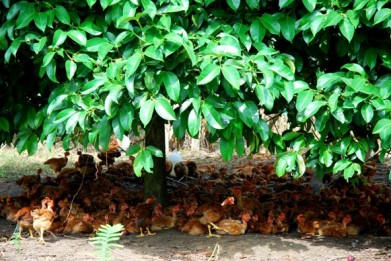
Free range chickens with mangosteen - here, hiding from the mid-day sun under the mangosteen fruit trees.
17:21 Posted in Permaculture | Permalink | Comments (2) | Tags: permaculture, free range chickens, sun shading, grey water treatment, integrated farming, permaculture examples, raised beds, companion planting, mulching, sheet mulching










